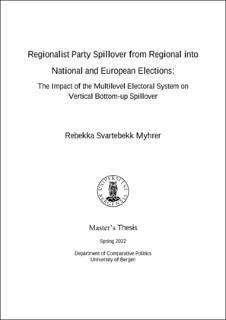Regionalist Party Spillover from Regional into National and European Elections: The Impact of the Multilevel Electoral System on Vertical Bottom-up Spillover
Master thesis
Permanent lenke
https://hdl.handle.net/11250/3000144Utgivelsesdato
2022-06-23Metadata
Vis full innførselSamlinger
- Master theses [113]
Sammendrag
This thesis explores how the permissiveness of the electoral system impacts regionalist parties’ vertical bottom-up electoral spillover effects from the regional electoral arena into the national and European electoral arenas in Western Europe. Over the last decades, regionalist parties have gained importance at the regional level and sought to enhance and protect regional autonomy in various regions across Europe. Additionally, this party family competes in national and European elections to voice their territorial demands. This thesis seeks to explain the extent to which the electoral system impacts regionalist parties’ spillover from the regional electoral arena. Previous research has indicated that the electoral system is a contributing factor in explaining spillover effects, however, the electoral system has mostly been used as a control variable distinguishing between majoritarian, proportional, and mixed systems. The issue with such crude measurements is that one may overlook how the electoral system plays out in different regions. The main argument of the thesis is that the permissiveness of the electoral system as measured through the number of additional votes needed to win a seat in a national or European parliament compared to a regional parliament, can explain the extent to which regionalist parties spill over their regional electoral strength into national and European elections. Multilevel mixed-effects linear regression modes were applied to a new dataset of regionalist parties’ electoral strength in regional, national, and European elections from 1950 until 2019. The results indicate that the number of additional votes needed to win a national or European arena impact the extent to which regionalist parties’ regional electoral strength spill over into national and European elections. Whilst the effects are more robust for spillover into European elections than national elections, the results indicate that the more additional votes regionalist parties need to win a national or European seat, the less likely they are to have a strong regional vote share at the national or European level. Overall, the thesis demonstrates how the permissiveness of the electoral system matters in explaining vertical bottom-up electoral spillover.
